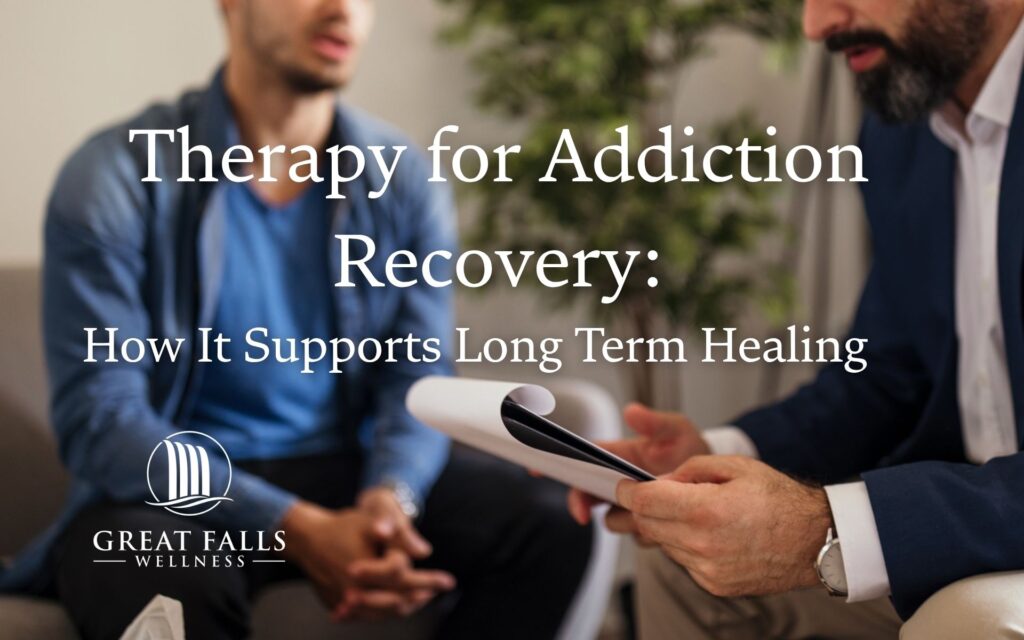Therapy for addiction recovery plays a vital role in helping people move beyond substance use and build a healthier life. At Great Falls Wellness, we believe that therapy gives individuals the tools to make lasting changes, not just short-term progress.
Recovery isn’t just about stopping a behavior. It’s about understanding what led to it in the first place and learning how to stay strong when life gets hard.

Understanding What Fuels Addiction
Therapy helps people explore the underlying causes of addiction, including trauma, stress, and mental health conditions. These deeper issues are often what drive substance use in the first place.
As noted by the National Institutes of Health, “Effective addiction treatment attends to multiple needs of the individual, not just his or her drug use” (SAMHSA, 2005). Addressing those emotional and psychological needs helps reduce the risk of relapse and supports true recovery.
Building Better Coping Skills
Many people use substances to manage stress or difficult emotions. Without new coping tools, those same challenges can quickly lead to relapse.
Therapy offers a space to learn healthier ways to manage cravings and emotional ups and downs. According to WebMD, “Therapy helps people manage emotions, deal with cravings, and create a plan to avoid relapse” (WebMD). These skills are essential for long-term stability and emotional health.
Healing Relationships Through Communication
Addiction often damages family relationships. Therapy can help repair those bonds by improving communication and trust.
At Great Falls Wellness, we encourage both individual and family therapy so loved ones can better understand addiction and support each other through recovery. If you’re supporting someone in recovery or want help for yourself, you can contact us anytime.
Finding Strength in Peer Support
In addition to one-on-one therapy, group therapy plays a major role in recovery. It creates a space where people can share their experiences, offer support, and learn from one another.
Group settings help reduce isolation and encourage accountability. Clients see that they’re not alone, and they build strong relationships that support long-term sobriety.
Addressing Mental Health and Addiction Together With Therapy for Addiction Recovery
Many people living with addiction also face mental health issues like depression, anxiety, or PTSD. When both are treated together, recovery tends to be stronger and more sustainable.
As the National Institutes of Health explains, “Counseling and therapy address both substance abuse and mental health conditions in an integrated treatment plan” (SAMHSA, 2005). Treating the whole person, not just the substance use, leads to better outcomes.
A Whole-Person Approach to Healing
At Great Falls Wellness, we provide outpatient addiction treatment with a focus on individual therapy, group work, and family support. We serve clients across Northern Virginia and the greater Washington, DC area, including Great Falls, McLean, Vienna, Arlington, Oakton, Burke, Reston, Herndon, Falls Church, Fairfax, Bethesda, Potomac, and surrounding communities.
Therapy for addiction recovery is one of the most effective tools available for building a stronger, more stable future. While addiction can feel overwhelming, the right support can make all the difference. Rehab offers a structured space to heal, learn, and grow: emotionally, mentally, and physically. At Great Falls Wellness, we’re here to guide that journey with care, experience, and a commitment to helping each person reach lasting recovery.
Therapy for addiction recovery gives people the insight, tools, and support they need to create lasting change. It’s not just about what you’re leaving behind, it’s about building something better.
References
Substance Abuse and Mental Health Services Administration. (2005). Substance abuse treatment: Group therapy (Treatment Improvement Protocol Series No. 41). Rockville, MD: U.S. Department of Health and Human Services. Available from https://www.ncbi.nlm.nih.gov/books/NBK64223/
WebMD. (n.d.). Counseling and addiction: How therapy can help. https://www.webmd.com/mental-health/addiction/counseling-and-addiction-how-therapy-can-help



